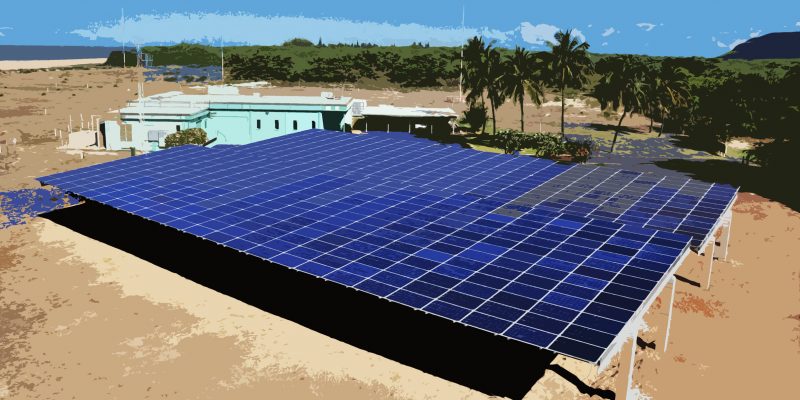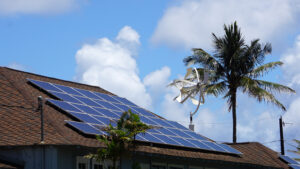The U.S. Solar Industry Is Clouded by Uncertainty
Investments are falling and jobs vanishing in the American solar sector. New tariffs on imports are blamed. A solar array powering a radio station in Hawaii. (D Okayama/K Talbott / Wikimedia Commons)
A solar array powering a radio station in Hawaii. (D Okayama/K Talbott / Wikimedia Commons)
The US solar industry is losing its shine. Although solar power is seen as a key way to avoid the use of climate-changing fossil fuels, US solar companies are cutting investments and laying off workers. An industry employing more than 230,000 people and with an estimated worth of $28 billion is now warning of trouble ahead.
More than 10,000 jobs in solar were lost in 2017, says a report by the Solar Foundation, a non-profit research firm.
The clouds spreading across the US solar sector are in part due to a slowdown in sales in so-called mature markets in California and the US Northeast, both areas of double digit solar growth in recent years.
However, industry analysts say the main reason for the present travails in the solar sector is the announcement earlier this year by President Donald Trump of a 30% tariff on imported solar panels.
Help at home
The aim, says Trump, is to support domestic manufacturers and stop the mass import of solar panels, mainly made in southeast Asia, South Korea and China. At present about 90% of solar panels installed in the US are imported.
“We’ll be making solar products now much more so in the US”, said Trump, announcing the imposition of tariffs in January.
“Our companies have been decimated and those companies are going to come back strong … a lot of workers, a lot of jobs.”
The overwhelming majority of people involved in the US solar sector are involved with installation and maintenance; a large number of firms also manufacture subsidiary products, such as racks for mounting the panels.
While some US-based manufacturers of solar panels – there are now very few of them – have welcomed news of the tariffs, most in the industry say the move is likely to drive up costs in what is a highly competitive energy sector.
Chinese domination
China now dominates the global solar power market; it’s the source of two thirds of the world’s total solar panel capacity and it also buys up half of the world’s production.
Chinese manufacturers have invested heavily in research and development and their solar products have become increasingly sophisticated.
US industry analysts say the products of domestic companies will be too expensive and will not be able to compete with other energies such as wind power or gas. Demand will fall, and jobs will be lost rather than gained.
From 2010 to 2016 solar power installations in the US went into overdrive, driven by falling costs and a range of government incentives. The industry says nearly 50GW of capacity is now installed – enough to power 10 million homes.
The Trump administration has made no secret of its wish to promote the use of fossil fuels – including coal – and remove incentives which were aimed at widening the use of renewable energies.
Some in the solar industry say that with or without the tariffs – which have been imposed on a sliding scale for a four-year period, with a 15% charge in the final year – solar power is very much here to stay. Demand might slow, but it will not stop.
In anticipation of the tariff hike, solar companies stockpiled a vast amount of imported solar panels last year; in the last three months of 2017 US imports of solar panels from China increased by more than 1,000% – enough to supply the industry for several months.
It seems that Trump’s efforts to discourage the use of renewable energy are not working in the way he might wish.
Recently growth in solar power installations has been particularly strong in the mid-west and south of the country – in pro-Trump states that have traditionally turned their backs on renewable energy and supported the president’s fossil fuel policies.
Your support matters…Independent journalism is under threat and overshadowed by heavily funded mainstream media.
You can help level the playing field. Become a member.
Your tax-deductible contribution keeps us digging beneath the headlines to give you thought-provoking, investigative reporting and analysis that unearths what's really happening- without compromise.
Give today to support our courageous, independent journalists.









You need to be a supporter to comment.
There are currently no responses to this article.
Be the first to respond.